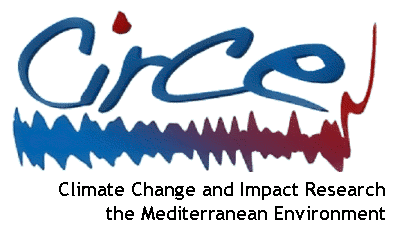

Potential Impact
The Mediterranean is positioned at the border between the tropical climate zone and the midlatitude climate belt. In most of the region, precipitation is concentrated in the winter months and the summers are relatively dry and hot. Summer storms, however, are very important in some regions (islands, for example). Climate change could modify this equilibrium. Regional water resources are already under severe economic and demographic pressure, and the effects of climate change could pose serious questions about the sustainability of the region. In particular, climate change and increased severity of weather extremes and land-use change may add to the existing problems of desertification, water scarcity, and food production; and introduce new challenges to human health, ecosystems, and national economies.
For instance, trends in European agriculture are dominated by the EU Common Agricultural Policy (CAP). The CAP reform of 1992 reduced intervention prices by one third and substituted this by area payments, including set-aside schemes. This process of reducing and transforming subsidies is continued in the Agenda 2000 reform. In 2003 it was decided to totally decouple agricultural subsidies from production. Future payments to farmers will be linked to environmental issues, food safety, animal and plant health, and animal welfare standards, as well as the requirement to keep all farmland in good agricultural and environmental condition ("cross-compliance"). Climate change could wreak havoc with this scenario, changing established methods and practice, reducing biodiversity, and resulting in huge financial demands from the sector. CIRCE will produce the first comprehensive integrated regional assessment of climate change impacts in the Mediterranean region, attempting to integrate knowledge from several disciplines, focusing on the Mediterranean area and filling up research gaps when necessary.
The project will foster regional cooperation, infrastructure establishment, scientific training and dialogue with policy makers. It will also constitute a coherent contribution to the IPCC process and to major international programs such as IGBP. CIRCE will also respond to the ESSP (Earth System Science Partnership) initiative on helping to understand the Earth System, the changes that are occurring to the System, and the implications of these changes for global sustainability. Considering specifically the Mediterranean area, the objectives of CIRCE reflect important issues and motivations raised by the scientific community in the MedCLIVAR project (endorsed by CLIVAR and ESF) for which CIRCE represents a fundamental support.
CIRCE will integrate scientific effort within a wider social and economic context. The direction of the scientific discourse will be discussed with diverse stakeholder groups through focus groups, consensus conferences, scientific forums, and workshops. This interaction will help to better define the questions and issues addressed by the scientific analyses. A communication strategy will be defined to disseminate the results of the project to the media and the public. This will include assessing the impact of the project and its results on the media and public events; and also the implementation of specific actions, for example, consensus conferences, and events held in science museums.
A number of essential stakeholders have already been identified through existing cooperation with CIRCE partners. These currently include: the Ministries of Environment of Italy, Spain, Algeria and Greece; Ministry of Health of Italy; Consorzio Venezia Ricerche, Italy, Ministere de l Agriculture et des Ressources Hydrauliques Algerie; Regional Government of the Valencia Region and of Tuscany Region; Hellenic National Meteorological Service (HNMS); General Secretariat for Civil Protection (GSCP), Greece; Athens International Airport (AIA); European Environmental Agency; European Technology Platform on Forestry and Forest Products; Corpo Forestale dello Stato (Italian Forest Service) and other National Forest Services in Europe and NorthAfrica/Middle East; European Observatory of Mountain Forests EOMF; CEPF- Conseil Europeenne de Proprietaires Forestiers; FEDERFORESTE-Associazione Italiana Consorzi Forestali pubblici e privati; FEDERPARCHI-Associazione Italiana dei Parchi e Riserve naturali; Environment and Natural Resources Service (SDRN-FAO); The Agricultural Research Organization of Israel; Entreprise Nationale d'Amenagement des Reserves des Parcs Nationaux et de Loisirs ENARP, Algeria; and, Fondation Deserts du Monde. Other stakeholders will become involved as the project progresses via CIRCE partner networks such as the EXCITE network of science museums, the Mediterranean Program of the WWF, and so on.